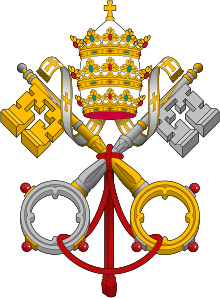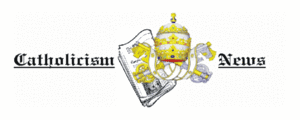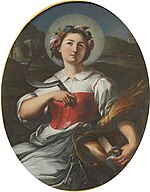Portal:Catholic Church
Introduction The Catholic Church, also known as the Roman Catholic Church, is the largest Christian church, with 1.28 to 1.39 billion baptized Catholics worldwide as of 2024. It is among the world's oldest and largest international institutions and has played a prominent role in the history and development of Western civilization. The church consists of 24 sui iuris churches, including the Latin Church and 23 Eastern Catholic Churches, which comprise almost 3,500 dioceses and eparchies around the world. The pope, who is the bishop of Rome, is the chief pastor of the church. The Diocese of Rome, known as the Holy See, is the central governing authority of the church. The administrative body of the Holy See, the Roman Curia, has its principal offices in Vatican City, a small independent city-state and enclave within the Italian capital city of Rome, of which the pope is head of state. The core beliefs of Catholicism are found in the Nicene Creed. The Catholic Church teaches that it is the one, holy, catholic and apostolic church founded by Jesus Christ in his Great Commission, that its bishops are the successors of Christ's apostles, and that the pope is the successor to Saint Peter, upon whom primacy was conferred by Jesus Christ. It maintains that it practises the original Christian faith taught by the apostles, preserving the faith infallibly through scripture and sacred tradition as authentically interpreted through the magisterium of the church. The Roman Rite and others of the Latin Church, the Eastern Catholic liturgies, and institutes such as mendicant orders, enclosed monastic orders and third orders reflect a variety of theological and spiritual emphases in the church. Of its seven sacraments, the Eucharist is the principal one, celebrated liturgically in the Mass. The church teaches that through consecration by a priest, the sacrificial bread and wine become the body and blood of Christ. The Virgin Mary is venerated as the Perpetual Virgin, Mother of God, and Queen of Heaven; she is honoured in dogmas and devotions. Catholic social teaching emphasizes voluntary support for the sick, the poor, and the afflicted through the corporal and spiritual works of mercy. The Catholic Church operates tens of thousands of Catholic schools, universities and colleges, hospitals, and orphanages around the world, and is the largest non-government provider of education and health care in the world. Among its other social services are numerous charitable and humanitarian organizations. (Full article...) Selected article
 The papal conclave of 1492 (August 6 – August 11, 1492) convened after the death of Pope Innocent VIII (July 25, 1492), elected Rodrigo Borja as Pope Alexander VI. The first conclave to be held in the Sistine Chapel, the election is notorious for allegations of simony. Of the twenty-three cardinals participating in the conclave, fourteen had been elevated by Pope Sixtus IV. The Cardinals of Sixtus IV, known as the "Sistine Cardinals" and led by Giuliano della Rovere, had controlled the conclave of 1484, electing one of their own, Giambattista Cibo as Pope Innocent VIII. Since 1431 the composition of the College of Cardinals had been radically transformed, increasing the number of cardinal-nephews (from 3 to 10), crown-cardinals (from 2 to 8), and representatives of powerful Roman noble families (from 2 to 4). With the exception of three curial officials and one pastor, the cardinals were "secularly-minded princes largely unconcerned with the spiritual life of either the Latin church or its members." At the time of Innocent VIII's death, the names of Cardinals Gherardo and Sanseverino had not been published, thus making them ineligible to participate in the conclave; however, both were published as an act of the College in sede vacante, Gherardo having been pushed by Orsini and Sanseverino by Sforza.
Selected image
 Credit: Detroit Publishing Co.
A ca. 1890–1900 photochrom of St. Alexander's Church (Kościół św. Aleksandra in Polish), a Catholic church in Warsaw, Poland, before its destruction in World War II. After the war it was rebuilt on a smaller scale. Selected biography
Did you know...

Related portalsFeast Day of September 14
Selected quote

News
SubcategoriesTopics
The Holy Bible:
Particular Churches (grouped by liturgical rite):
Things you can do
External resourcesWikiProjectsAssociated WikimediaThe following Wikimedia Foundation sister projects provide more on this subject:
Discover Wikipedia using portals |

































